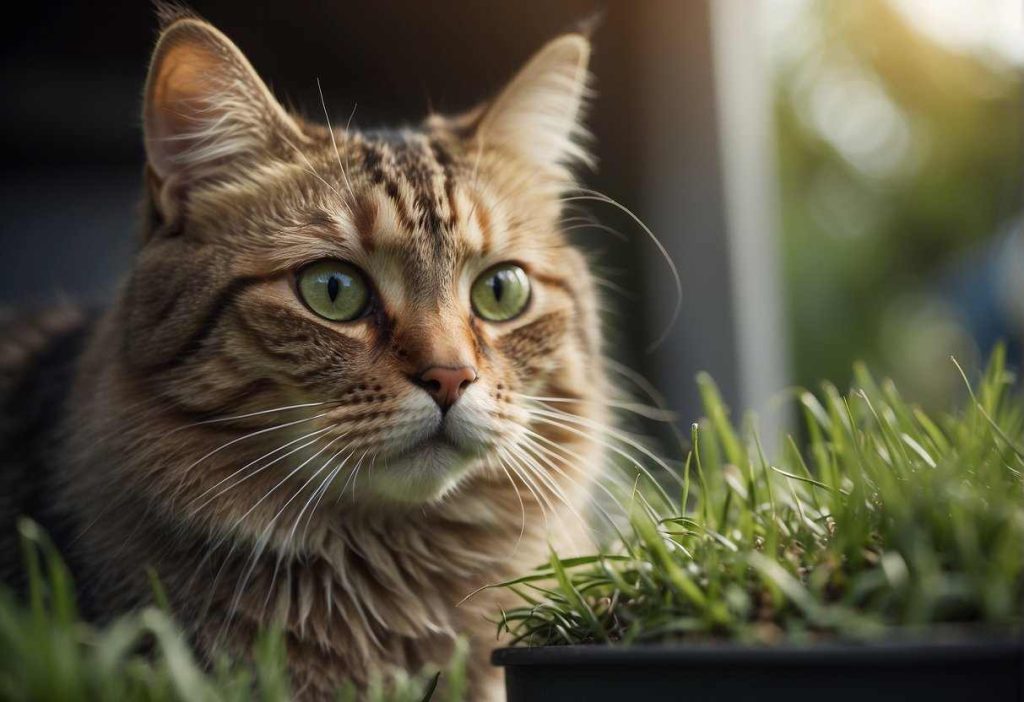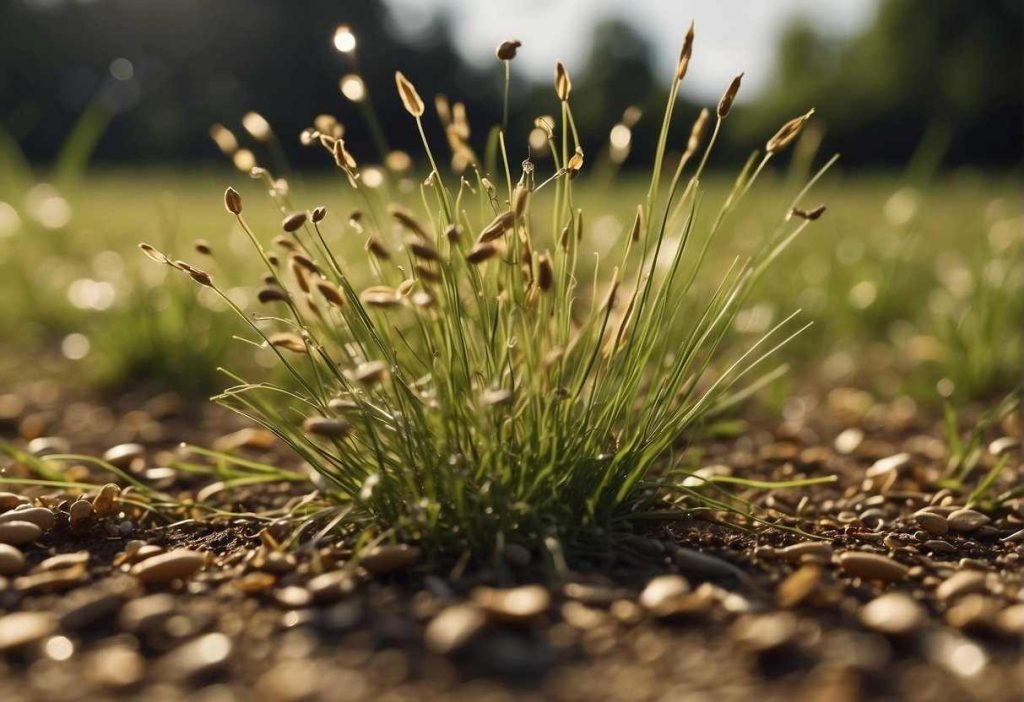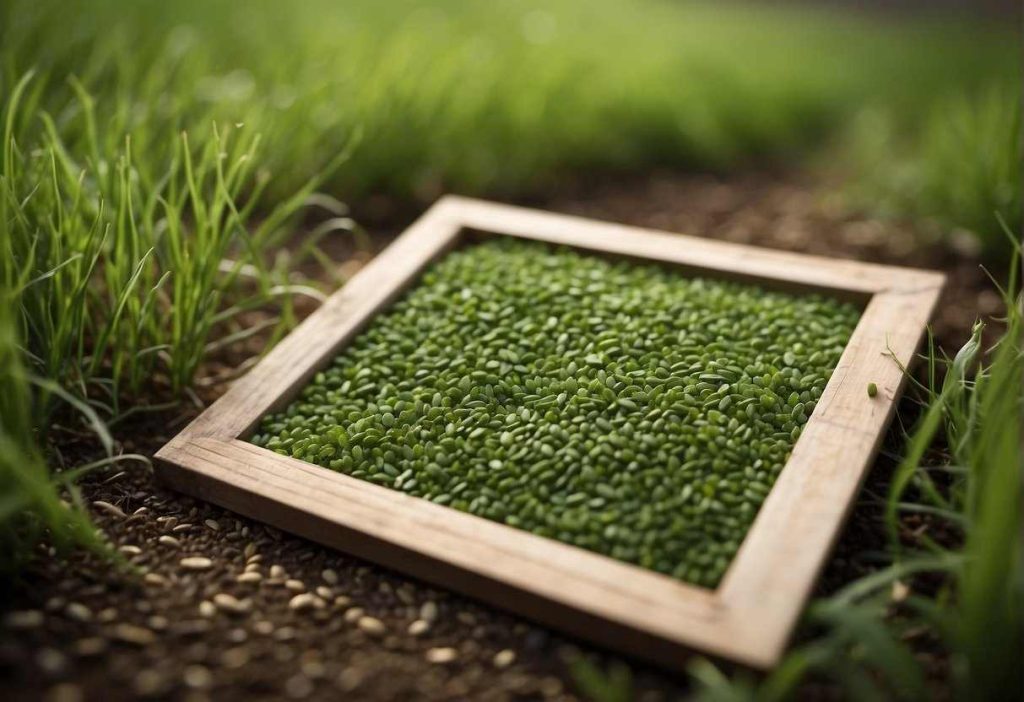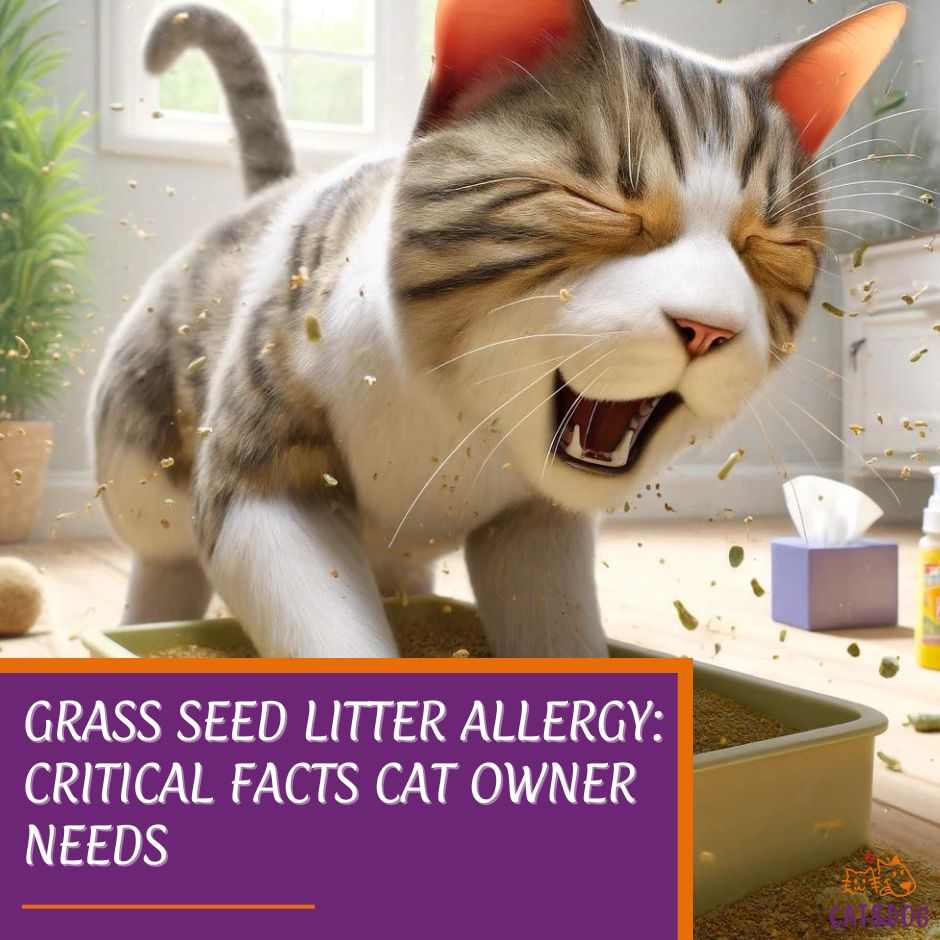Have you ever noticed your cat sneezing or wheezing after a trip to their litter box? It could be more than just a little tickle in their nose.
Grass seed litter allergy in cats is a growing concern among pet parents who seek natural options for their feline friends.
Grass seed litter, created from natural grass seeds that are milled into pellets, is praised for its eco-friendly and biodegradable qualities. (1)
Its strong clumping ability, natural odor control, and lightweight properties make it an attractive choice over traditional clay litters. (2)

However, for some sensitive kitties, the very grass seed pellets designed to be safe and natural can trigger allergic reactions.
These allergies manifest through respiratory distress like coughing or sneezing, skin irritations, and even gastrointestinal issues if ingested.
While grass seed litter produces low amounts of dust, which is beneficial for those with respiratory sensitivities, the plant-based material itself can be an allergen.
As they groom, cats may ingest small amounts of litter, which is generally safe with grass seed but can still pose a problem for those with allergies.
When selecting a litter, you may have pondered, “Is grass seed litter safe for cats?” It’s essential to watch for signs of discomfort or allergy and know what steps to take if they arise.
But don’t worry, with proper management and some practical tips, you can create a safe and comfortable environment for your allergy-prone feline.
Key Takeaways
- Grass seed litter allergy in cats can trigger respiratory issues, skin irritations, and gastrointestinal problems.
- Grass seed litter is eco-friendly, easy to clean, and generally safe for cats, but it can be an allergen.
- Identifying and managing allergies effectively ensures the well-being of cats using grass seed litter.
Recognizing and Diagnosing Grass Seed Litter Allergies

Symptoms of Grass Seed Litter Allergies:
- Common Symptoms to Watch For:
- Frequent sneezing, nasal discharge.
- Red, watery eyes.
- Itchy, irritated skin, especially around paws and face. (3)
- Coughing or wheezing, signaling respiratory concerns.
- Behavioral Changes in Affected Cats:
- Litter box aversion. (4)
- Increased grooming or scratching.
- A drop in energy or unusual irritability.
Diagnosing Litter Allergies:
- Veterinary Tests and Procedures:
- Home Observation and Allergy Tests:
- Watch for symptom patterns before and after a litter switch.
- Keeping a symptoms diary? Super helpful for tracking changes.
- If you reintroduce grass seed litter and the sneezes return, you might have found the problem.
Remember, you’re not alone in this! Many cats experience allergies, and pinpointing the cause is a big step towards a sneeze-free, happy cat.
Managing Grass Seed Litter Allergies in Cats

Treatment Options for Allergic Reactions
- Antihistamines: These can help reduce the allergic reactions your cat may be experiencing. (7)
- Corticosteroids: These are used in cases of severe inflammation.
- Antibiotics: If your cat has started scratching and caused a secondary infection, veterinarians may prescribe these.
Natural Remedies and Home Care:
- Aloe vera or oatmeal baths: Wonderful for soothing irritated skin.
- Humidifiers: Can be a game-changer for easing respiratory symptoms.
- Omega-3 supplements: These are great pals for supporting the health of your cat’s skin.
Preventive Measures and Best Practices:
Choosing Hypoallergenic Litters:
- Keep an eye out for unscented, low-dust, and single-ingredient litters. Not only are they kinder to sensitive noses, but they also help keep those pesky allergies at bay.
Recommended Brands: Brand Name Feature Dr. Elsey’s Respiratory Relief Designed to reduce respiratory issues ökocat Natural Wood Wood-based, free of synthetic chemicals
Maintaining a Clean and Allergy-Free Environment:
- Make it a routine to clean the litter box regularly, significantly reducing allergen buildup.
- Air purifiers are like your allergy-fighting sidekicks – they help minimize airborne particles.
- Don’t forget to wash bedding and toys frequently. Trust me; it’s a simple but mighty step to remove allergens from your furry friend’s space.
Remember, these suggestions are to keep your whiskered companion happy and healthy amidst their battles with allergies!
Practical Allergy Management Tips

Steps to Prevent Allergies:
- Test the Waters: When introducing new grass seed litter, do it gradually. This means adding a little of the new litter to the old one and observing for any signs of an allergic reaction.
A slow transition can help you pinpoint the culprit if allergies arise. - Keep it Simple: Choose grass seed litters that boast fewer additives and shy away from strong fragrances. A less-is-more approach often means fewer sneezes!
If allergies do flare up, don’t worry; we’ve got strategies for swift management.
Tips for Managing Allergies if They Occur:
- Eliminate the Trigger: Once you notice allergy symptoms, remove the suspected allergen pronto.
- Seek Professional Help: If symptoms persist, your next stop should be your vet’s office. They can offer treatments personalized to your pet’s needs.
Remember, nobody knows your pet better than you do, so trust your instincts and act promptly. By following these straightforward steps, you and your furry friend can breathe easier!
In-depth Comparative Analysis

Are All Litters Created Equal? No siree.
- Grass Seed Litter: Typically generates less dust and has a softer footprint on the environment. But watch out – it can still cause allergies if you’re sensitive.
- Clay Litter: It’s popular but can be a dusty affair, often leading to sneeze-fests.
- Silica Gel Litter: Super absorbent with minimal dust, but it can get pricey.
What’s the Word on the Street? Customers often share how switching litters can be game-changing.
Some who’ve switched to grass seed litter mention a noticeable downturn in allergic reactions. However, others report no difference. Confusing, right?
Which Litter Takes the Cake? For Hypoallergenic Wins:
- Bamboo-Based Litter: Low dust and eco-friendly.
- Paper-Based Litter: Soft on noses and paws alike.
Direct from Cat Owners’ Mouths Your fellow cat enthusiasts mention bamboo and recycled paper litters as allergy lifesavers.
One cat owner shared, “Switching to paper litter stopped my sneezes – and my kitty loves it!”
Vets also chime in with two cents: “Look for litters labeled ‘hypoallergenic’ and ‘dust-free’ for both your and your pet’s comfort.”
What’s the Bottom Line? While grass seed litter is a greener choice, for the sneeze-prone, bamboo or paper varieties might be the golden ticket.
Remember, what works for one might not work for another, so a little trial and error could lead you to an “Achoo!” free life! Happy litter hunting!
Is Grass Seed Litter Safe for Cats?
Safety Assessment of Grass Seed Litter
- Toxicity and Health Risks: You’ll be relieved to know that grass seed litter is generally non-toxic.
- If your kitty decides to taste it (you know how curious they can be!), a little nibble won’t hurt. However, watch out for overindulgence, as it might lead to a tummy ache or worse, a gastrointestinal blockage.
- Long-term Effects: Good news! Most whiskered companions don’t face any dire health effects even with continuous use. But, keep an eye out. Some cats may develop allergies if they’re rolling in it over time.
Comparative Analysis of Litter Types
Have a peek at how grass seed litter stacks up against the others:
| Litter Type | Pros | Cons |
|---|---|---|
| Grass Seed Litter | Natural, biodegradable, less dusty | Possible allergy risk |
| Clay Litter | Cost-effective, easy to find | Non-renewable, dusty, environmentally harsh to mine |
| Silica Litter | Fantastic at odor control | Can trigger respiratory issues, takes ages to decompose |
Environmental Impact and Sustainability
Alright, eco-warrior, let’s think green!
Grass seed litter is a thumbs-up for Mother Earth. It’s made from a renewable resource and can join your compost pile — helping your garden bloom.
The alternatives? Not so rosy.
Clay litters require digging and damage the earth, and silica is a no-go for the compost bin. So, what’s the verdict?
If you’re leaning towards the sustainable choice and your cat’s not the type to go overboard on grass-snacking, grass seed litter could be a purr-fect match.
Just keep an eye on them to prevent any blockage issues, and be mindful of allergies. Happy litter shopping!
Grass Seed Dangers Beyond Litter
Outdoor Grass Seed Hazards
Have you ever thought about the unassuming dangers of some common grass seeds lurking in your backyard? Especially foxtails and wild barley.
These guys can be problematic, not just as litter on your pristine lawn but as hazards to you and your furry friends.
Identifying Dangerous Grass Seeds
When you’re out and about enjoying nature, it’s good to keep your eyes peeled for dangerous grass seeds. Foxtail grasses, for instance, have a distinctive brush-like spike that can cling to fur and clothes.
Wild barley, with its barbed awns, tends to thrive in dry fields and overrun areas. Remember, a quick visual scan of your surroundings can save the day.
Protecting Pets from Grass Seed Injuries
It’s all fun and games until someone gets a grass seed stuck! Check this out:
- Regular grooming: Brush your pets thoroughly after outdoor escapades.
- Vigilant inspections: Look for sneaky seeds in their coats, paws, and ears.
And, if you know of a grass seed hotspot, maybe give it a miss during your walk.
Symptoms of Grass Seed Ingestion or Injury
Oops, did your pet just gobble something down? Grass seeds can cause:
- Excessive licking or biting at a spot,
- Shaking their head like they’re at a heavy metal concert, or
- Any unusual lumps.
Immediate Actions and First Aid
Got a seed invader on your hands?
- Seed removal: If you spot a seed, gently pluck it out.
- Flushing: Rinse the spot with saline to ensure it’s really clean.
Long-term Management and Veterinary Care
Keep an eye on the area for weird changes.
If you’re seeing signs that something’s not right, your vet should be your next stop.
They might suggest treatments from antibiotics to surgery, depending on what’s needed. Your buddy’s health warrants no less, right?
Expert Opinions and Recommendations

Veterinary Insights on Grass Seed Litter
Veterinarians recommend selecting hypoallergenic litters to minimize allergy risks for both pets and their owners.
Hypoallergenic varieties tend to be easier on sensitive respiratory systems and can be a game-changer for a sneeze-free environment.
Expert Recommendations
- Identify: Determine if grass seed litter is causing allergies.
- Substitute: Opt for hypoallergenic alternatives.
- Consult: Speak with a vet when choosing a new litter.
Tips for Allergy Prevention and Management
- Maintain a clean litter area.
- Regular grooming of your cat to reduce dander.
- Air purifiers can help remove allergens from the air.
Case Studies and Real-life Examples
Several owners reported successful transitions to hypoallergenic litters, noticing a decrease in sneezing and respiratory issues.
In more severe cases, changing to a new litter has significantly improved symptoms and quality of life.
User Reviews and Experiences
Positive Feedback
- Less Dust: “Our house is finally clean!”
- Reduced Allergies: “I can breathe again!”
Negative Feedback
- Preference: “My cat took some time to adjust.”
- Cost: “Slightly higher priced, but worth it.”
Common Challenges and Solutions
- Adjustment: Gradually mix new litter with the old.
- Preference: Allow your cat to have a choice initially.
- Cost Concerns: Consider it an investment in health.
Your feline friends and their human companions deserve a comfortable and allergy-friendly environment. Transitioning to a hypoallergenic litter could be the answer.
Remember, managing allergies is a journey, and you’re not alone. Speak to your vet and try these tips for happier, healthier cohabitation.
Quick Recap

Let’s go over what we’ve learned:
- Benefits & Risks: Grass seed litter is eco-friendly and biodegradable, but hey, it might just be the source of your cat’s recent sneeze marathon.
- Allergy Red Flags: Watery eyes or constant scratching could signal your feline friend is not all that thrilled with their litter.
What Can You Do?
- Monitor: Keep a close eye on your cat. Something as simple as a change in litter can make a world of difference to their comfort.
- Consult: Your vet’s advice is as precious as catnip for these matters. They know just the trick for these pesky allergies.
- Alternatives: Hypoallergenic litters could be your cat’s next best friend. It’s like switching to a new brand of treats but for their litter box!
Remember, keeping your furry companion happy and comfortable is just a litter switch away. Stay observant, seek advice, and consider healthy alternatives. Happy scooping!
Frequently Asked Questions

What are the signs of a grass seed litter allergy in my cat?
Your cat may exhibit itching, redness of the skin, or excessive grooming. Sneezing or a runny nose can also be signs of a grass seed litter allergy.
How can I confirm if my cat is allergic to grass seed litter?
If you suspect an allergy, consult with your vet. They might recommend an elimination diet or allergy testing to determine the specific allergen causing the reaction.
What should I do if my cat shows signs of an allergy to grass seed litter?
Immediately cease using the current litter and consider switching to a hypoallergenic option.
You should also take your cat to the vet for a proper diagnosis and treatment plan.
Are there hypoallergenic alternatives to grass seed litter?
Indeed, there are! Paper-based litter, silica gel litter, or dust-free clay litter can be excellent alternatives for cats with allergies.
Can grass seed litter cause respiratory issues in cats?
Yes, it could. Cats with respiratory sensitivities may experience difficulty breathing when exposed to allergens in grass seed litter.
How often should I change the litter to prevent allergies?
Regular cleaning can help. Aim to change the litter at least once a week, and scoop waste daily to keep allergens at bay.
Can natural remedies help alleviate litter allergies in cats?
While natural remedies may offer some relief, it’s essential to consult your vet first. This will ensure they are safe and effective for your cat’s specific condition.
- Free Online Casino Games: What You Need to Know - July 26, 2025
- Ideal Casinos Mobile: The Ultimate Guide to Mobile Betting - July 26, 2025
- The Ultimate Overview to Casino Site Gamings Online - July 26, 2025


